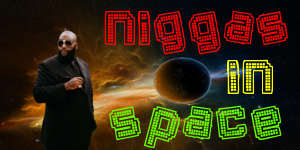

User Controls
The Time Has Come (ah thank) .....
-
2024-08-27 at 3:09 PM UTCafter 20+ years or so on the internet, i think i've finally mastered english (which is a language i dont even use IRL) to a level sufficient enough for me to express myself and convey my thoughts and feelings as natively and as raw as possible for the international readers and audiences to experience ...
i think its time for me to spread my wings (and cheeks) be-ond the walls of this dark and hairless underbelly of the internet and begin publishing on the open internet, and for selfish monetary gains, along with fame and prestige.
so wish me luck fuys and feet fail me not.
seig hail. -
2024-08-27 at 3:15 PM UTCTry that again in English not Engrish
-
2024-08-27 at 3:28 PM UTCah dont bend muh knees for white supremacy
-
2024-08-27 at 3:31 PM UTC
-
2024-08-27 at 3:48 PM UTC
-
2024-08-27 at 3:54 PM UTCIt is impressive to me that so many citizens of other countries know English or at least some English or at least try really hard to learn it because apparently it's one of the most difficult languages too Pick Up After Your formative years. We Americans in general don't bother trying to learn other countries languages which is probably arrogant of us. I'm fluent enough in Spanish to communicate the basics but that's it.
-
2024-08-27 at 3:55 PM UTCI will give Vincent props here because I wouldn't bother to go to a website from another country and try to learn that language to communicate on it. I have no idea why vindictive Vinny would do such a thing but it's pretty cool that he didThe following users say it would be alright if the author of this post didn't die in a fire!
-
2024-08-27 at 3:55 PM UTCQuit stealin ma languige.
-
2024-08-27 at 4:08 PM UTC
Originally posted by WellHung It is impressive to me that so many citizens of other countries know English or at least some English or at least try really hard to learn it because apparently it's one of the most difficult languages too Pick Up After Your formative years. We Americans in general don't bother trying to learn other countries languages which is probably arrogant of us. I'm fluent enough in Spanish to communicate the basics but that's it.
You can thank the British Empire for the servile familiarizing themselves with English. -
2024-09-01 at 3:30 PM UTC
Originally posted by WellHung I will give Vincent props here because I wouldn't bother to go to a website from another country and try to learn that language to communicate on it. I have no idea why vindictive Vinny would do such a thing but it's pretty cool that he did
somebody have to keep making the text files -
2024-09-01 at 3:33 PM UTC
-
2024-09-01 at 3:35 PM UTCmfw learning every human language that has ever existed all at the same time
https://en.wikipedia.org/wiki/List_of_Unicode_characters
U+2058 ⁘ FOUR DOT PUNCTUATION
U+2059 ⁙ FIVE DOT PUNCTUATION (Greek pentonkion)
U+205A ⁚ TWO DOT PUNCTUATION
U+205B ⁛ FOUR DOT MARK
U+205C ⁜ DOTTED CROSS
U+2E0E ⸎ EDITORIAL CORONIS
U+2E0F ⸏ PARAGRAPHOS
U+2E10 ⸐ FORKED PARAGRAPHOS
U+2E11 ⸑ REVERSED FORKED PARAGRAPHOS
U+2E12 ⸒ HYPODIASTOLE
U+2E13 ⸓ DOTTED OBELOS
U+2E14 ⸔ DOWNWARDS ANCORA
U+2E15 ⸕ UPWARDS ANCORA
U+2E16 ⸖ DOTTED RIGHT-POINTING ANGLE (diple periestigmene)Obelism is the practice of annotating manuscripts with marks set in the margins. Modern obelisms are used by editors when proofreading a manuscript or typescript. Examples are "stet" (which is Latin for "Let it stand", used in this context to mean "disregard the previous mark") and "dele" (for "Delete").
The obelos symbol (see obelus) gets its name from the spit, or sharp end of a lance in ancient Greek. An obelos was placed by editors on the margins of manuscripts, especially in Homer, to indicate lines that may not have been written by Homer. The system was developed by Aristarchus and notably used later by Origen in his Hexapla. Origen marked spurious words with an opening obelos and a closing metobelos ("end of obelus").
There were many other such shorthand symbols, to indicate corrections, emendations, deletions, additions, and so on. Most used are the editorial coronis, the paragraphos, the forked paragraphos, the reversed forked paragraphos, the hypodiastole, the downwards ancora, the upwards ancora, and the dotted right-pointing angle, which is also known as the diple periestigmene. Loosely, all these symbols, and the act of annotation by means of them, are obelism.
These nine ancient Greek textual annotation symbols are also included in the supplemental punctuation list of ISO/IEC 10646 standard for character sets.